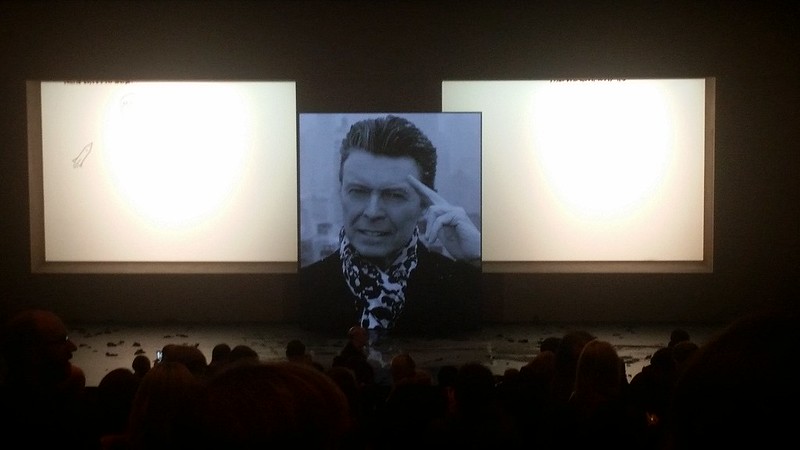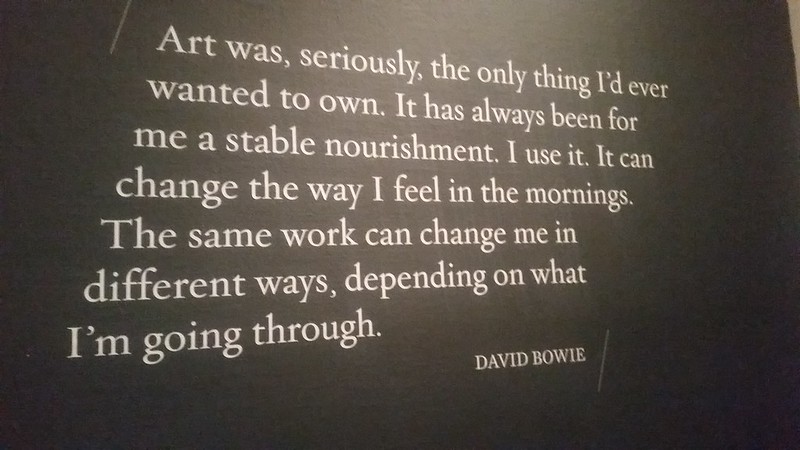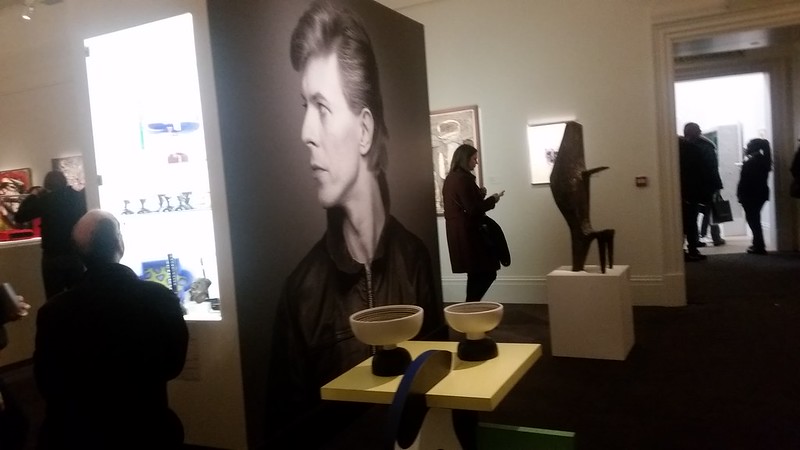
"Lazarus"

Alongside “Black★”, “Lazarus” is the final David Bowie statement : whereas “Black★” turned his death and mortality into a work of art – nobody ever died so well - “Lazarus” is a powerful, dense, and difficult look back through his body of work that recontextualises his past so it faces to his death as well.
Built in a collaborative workshop with Ivo Van Hove and a team picked by Bowie, “Lazarus” picks up the key threads of Bowie's 1976 The Man Who Fell To Earth, and posits the question of “What happened on The Next Day?”.
In this case, Bowie and the team allow this to become allegorical, and not, I suspect through chance. Michael C Hall plays Bowie surrogate TJ Newton (and he does so with a mastery I envy), an alien who fell to earth and is now trapped in these earthly chains. A more effective metaphor for all of us there could not be. After all, aren't we all trapped in our skins, our worlds, these realities we have not chosen? At one point, Newton explicitly says “None of us chose the heads we are born with”.

It opens with Newton, isolated and retired in a New York Apartment, not reading all the books he's wanted to read, but instead slowly going mad. Lazarus is about his quest to escape the reality he lives in ; and, as the plot unravels, it becomes increasingly clear that maybe he has succeeded but not in the way he wanted to. Drawing together songs new, very new (including Bowie's final recordings), and very old, the narrative pulls a common, perhaps hidden theme of the material and recontextualises Bowie's past in a way that adds a richness to them.
Songs such as “Life On Mars” and “Changes” were glorious kitchen sink dramas ; now “Life On Mars” is just about that, but the added element is about a man trying to escape, get off here, free the earthly chains, trying to live life on an alien planet. The placement of the songs and the dialogue are considered, thoughtful, and add new light to the old material. Even “It's No Game” tells, by the title itself, what this is all about. It is a matter of life and death. And, the imagery harks back to old Bowie work. You can easily see this presentation, with some mild amends, as the staging for a challenging Bowie tour that never happened, or perhaps a way of dramatising mortality and the process of coming to terms with the end of our time. Were Bowie alive, I'm not sure how we would read this.. difficult, confusing, challenging. But Lazarus is more than that. The plot is somewhat obtuse – scenes make an emotional sense, but you either experience it on a musical / emotional level as a connecting thread, or in a more literal way about a Rich Old Man Looking For A Spaceship.
The band are well chosen, precise, and accurate – replicating the haunting “Black★” sound but also updating Bowie's material with sensitivity. The Man Who Sold The World – presented in the same arrangement of the Outside Tour has a new context, the line “face to face” isn't just about two human faces, but about turning your face to face an abstract, being The Man Who Sold The World … but which world? His world? Our world? The future? There's so many interpretations available. It's all there. It just depends how deep you can dive. What this does is add an extra layer to Bowie's past ; to show you where he was, and that there was more than you might have originally thought. Some of the obscure material is repurposed : I was never a fan of “Valentine's Day”, and yet here, it's the same song yet also brand new. Everything makes a different kind of sense now.

At the end, Lazarus is dense, challenging and rewarding. Bowies work becomes new. The imagery he used all through his work has a new meaning: no longer a desire to explore other planets, but when Michael C Hall proclaims, definitively, “I'm done with this life. I have to explore other universes!”, it's clear that there aren't just other planets. It was all about finding new worlds, new levels of consciousness, new ways of existing. The final song is “Heroes” as the cast prepare to leave in their vessel.. leave what and go where is unclear.. but to a new land, beyond perhaps even life itself, the song becomes an inner monologue, about our spiritual lives, about who we are inside our own minds, where I will be King. And you will be queen. A hopeful anthem could become a sign of hopeless retreat into our own minds. And, like much of the best work, by anyone anywhere, it works.
“Black★” may by Bowie facing his mortality in the moment. “Lazarus” is him looking back, turning the thousand strands of his past into something new and making sense of it all, even if it doesn't make sense to anyone but him. It's bold, baffling, and by no means easy, but rewarding.

(photographs mostly taken from Sotheby's exhibition Bowie / Collector)
